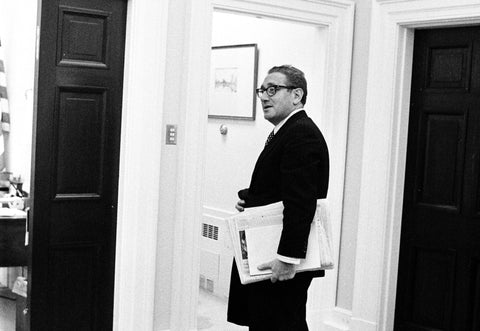
The Complicated Vietnam War Legacy of Henry Kissinger
Henry Kissinger, U.S. national security adviser and later secretary of state at the height of the Vietnam War, died on Nov. 29 at the age of 100. His polarizing career saw him serve every president from John F. Kennedy to Joe Biden, with achievements that included masterminding a new relationship with communist China, softening the Cold War friction with the Soviet Union through a diplomatic policy called détente, and eventually negotiating the withdrawal of U.S. troops from Southeast Asia and ending the Vietnam War, for which he was co-awarded (with North Vietnam’s Le Duc Tho, who declined his) the 1973 Nobel Peace Prize.
Born in Germany in 1923, young Kissinger and his Orthodox Jewish family emigrated to the United States in 1938 as the Nazis’ anti-Semitic policies ramped up. He was drafted into the U.S. Army in 1943, where he served as an interpreter in his native Germany as World War II was coming to an end—and where he saw firsthand the threats from the communist East that he feared were intent on upending democracy.
The intellectual Kissinger enrolled in Harvard in 1950, and soon began developing diplomatic theories of “realpolitik,” advocating for calculated foreign policies that delivered practical results, sometimes at the cost of a perceived larger morality. He was known and respected for his ability to broker high-level negotiations between nations with diametrically opposed ideological viewpoints. The BBC notes that Kissinger was the only American to have personally interacted "with every Chinese leader from Mao Zedong to Xi Jinping." In a testament to his ability to interface between nations with opposing worldviews, Kissinger's passing was mourned in China as well as by leadership of the European Union.
Nonetheless, Kissinger's approach to politics and diplomacy, which decidedly influenced U.S. foreign policy over the course of many decades, was controversial during his lifetime and remain so after his death. Kissinger was straightforward about his belief in separating morality from political affairs. Writing in The New York Times , former Deputy National Security Adviser Ben Rhodes argues in The New York Times _ that Kissinger's brand of realpolitik "mistakes cynicism — or realism — with wisdom." A tribute featured in The Independent _ however praises Kissinger's approach as "his finest of attributes".
Rising quickly through the U.S. government’s ranks, it was during his tenure as national security adviser to President Richard Nixon in 1969 that Kissinger's sense of realpolitik played out most controversially. Kissinger instituted a strategy of heavily-bombing Cambodia, a theoretically neutral country but long a sanctuary for North Vietnamese forces and resupply in the Vietnam War, to disrupt the flow of enemy troops and equipment.
While the policy may have had military merits, the bombing was too little, too late to have a strategic impact on the war’s outcome, and the deaths of tens of thousands of Cambodian civilians in the bombings remains a cloud on his record. The bombing, contends Rhodes, "did nothing to improve the terms on which the Vietnam War ended; if anything, it just indicated the lengths to which the United States would go to express its displeasure at losing."
All the same, Kissinger negotiated the end of the war after years of talks with North Vietnam, resulting in the Paris Peace Accords of 1973 and the withdrawal of American troops. South Vietnam fell two years later when Hanoi broke the accords, invaded South Vietnam and overran the country within weeks.
Kissinger stayed on as secretary of state under Nixon’s successor, Gerald Ford, until 1977. He continued advising future presidents on a myriad of topics. He counseled U.S. President George W. Bush and controversially supported the Iraq War. He lectured and published books and policy papers for many years, and remained actively engaged in foreign policy discussions until his death.
Debates about Kissinger's legacy will continue. An article published in The Rolling Stones blasted him as "a war criminal" immediately following his death. Marking his passing, U.S. Secretary of State Anthony Blinken hailed him as someone who "really set the standard for everyone who followed in this job.”
As for Kissinger himself? He was well-aware of the criticisms he faced but appeared to have been unfazed by them. "I've been thinking about these problems all my life…the recommendations I made were the best of which I was then capable," he later said. With regard to the Vietnam War, Kissinger was typically matter of fact: "We did the best we could."
